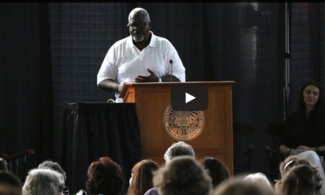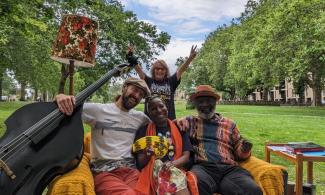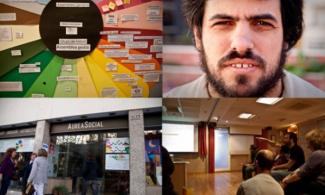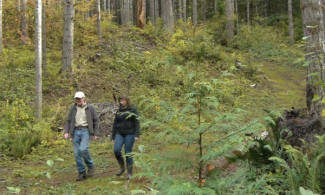
Originally published on David Bollier's blog
I delivered the following remarks last week at the Oxford Real Farming Conference, in Oxford, England, on January 5, 2024. It was part of a session in the Oxford Town Hall with the noted British activist-scholar-commoner Guy Standing, entitled, "Commons and Commoning: A Progressive Vision of a Good Society."
Below is my prepared text. A video can be found here (starts at 3:35 timecode). Guy Standing's excellent talk, reflecting a British perspective and themes from his books, The Blue Commons and The Politics of Time, can be found at the same link (starts at 30:30 timecode). There is audience Q&A with Guy and me following our talks.
Established systems don't welcome fundamentally new ideas – even when they desperately need them, even if people are clamoring for them. Entrenched systems see new ideas and logics as disruptive. They see them as threatening and even incomprehensible. And yet, as Albert Einstein famously said, "Problems cannot be solved with the same mindset that created them."
We're at an impasse today because contemporary institutions keep bringing the same mindset to solving problems that need some fresh and strikingly different approaches. The many problems afflicting agriculture and the food system today are fundamentally similar to those afflicting the rest of society. They are just another theater for rentier capitalism, which relies on market/state collusion, extractivism of nature, and systemic precarity for many ordinary people.
I don't want to denigrate the need for critique because the prevailing market/state system must be properly understood in all its awfulness. But what we most need is creative experimentation in developing a new, more wholesome paradigm. So my remarks will focus on how we can make some ambitious, creative leaps forward, and how the commons – as a discourse, social practice, ethic, and worldview – can be very helpful in meeting this challenge.
I'd like to explain how the commons can provide a strong, coherent framework – and many actual, practical projects – that open up some promising vistas of change. I will be channeling the old Buckminster Fuller advice: "You never change things by fighting the existing reality. To change something, build a new model that makes the existing model obsolete."
From browsing the program of this remarkable Oxford Real Farming Conference, it's clear that there are many, many fiercely creative and insurgent ideas and projects represented here – from soil improvement strategies to biodiversity initiatives, CSA farming innovations and new frontiers for agroecology, open source technologies in regenerative agriculture and ways to steward meadows and pastures. It's very impressive, but it's also fair to ask:
How can the amazing experiments now transforming agriculture and the food system become the new normal in politics, government policy, and everyday life?
How can existing experiments move from the margins and morph into the default paradigm?
In other words, how can we move from snatching a few crumbs from the table set by state-capitalism, and consolidate ourselves as a cultural juggernaut for regenerative agriculture, food sovereignty, land reform, and climate-preserving initiatives?
Now obviously, there are no easy or simple answers, but today I'd like to propose that reinventing the commons and commoning – a new and ancient social form – can help us break on through to other side. This challenge is at once cultural, social, economic, and political. It requires that we adopt a different mindset. It requires collective imagination, new social practices, and political action.
Here's a shorthand account of why we need the commons. In any number of purportedly representative democracies around the world, including the UK and US, citizen agency and liberty in politics are slowly being suffocated. State power, the major political parties, the news media, and neoliberal economics may have their differences, but they each regulate and define the scope of acceptable change. This agenda relies on some very tired and archaic ideas, such as:
“We must privilege economic growth at all costs because everything depends on that.”
“Capitalist finance and free markets offer the best solution-systems for achieving a better future.”
"Only national governments and political parties can solve challenges as big as climate change and social inequality and poverty."
And: “Only centralized hierarchies can get things done and done fast enough. We don't have time for anything else.”
These truisms are the key problem we must overcome. But what are we to do when the dominant system is so totalizing, powerful, and closed to rational persuasion? How do we build an alternative future? How do we overcome a system of elite politics that is unresponsive to the general population, trapped within archaic ideologies, and yet powerful and rich enough to win elections, control public funds, dictate capital investment, and manipulate public debate via the media businesses they own? What to do?
I draw inspiration and strategic guidance from Václav Havel, the Czech playwright. In the 1970s, when he and other cultural dissidents faced a repressive system impervious to serious change – in his case, the totalitarian Czech government – Havel called for the development of a "parallel polis."
A parallel polis is a horizontal world of relationships and provisioning that functions as a working alternative. It's about building convivial relationships and constructive projects with one another, which over time can ripen into a prefigurative new order. A parallel polis offers spaces in which people can mutually support each other, and directly produce what they need. People can think independently, debunk official propaganda and expand their imaginations about what's possible. They can speak the truth, cultivate wholesome ambitions, and muster the courage to do what is needed.
The point of a parallel polis is not to withdraw from politics and culture into utopian fantasies – but rather to build a world that has its own integrity and working capabilities outside of the dominant system.
A parallel polis also chooses different strategies for moving forward. The first priority is not to bang at the door of governments and political parties to seek change. That may be necessary in some measure. But that path is doomed to disappoint so long as the norms of the current market/state system are intact. As recent history shows, even in places like Greece and Bolivia where left-wing parties took over the state, the results have been problematic – chiefly because international capital can continue to bully, co-opt, and constrain the state and social movements.
By contrast, even a small but functional parallel polis of working commons – if properly insulated from these forces – can exert great leverage. We saw this in the early days of Linux and open source software….in the ways that local food movements forced changes on Big Ag…. and in the power of local solidarity when it is organized, as seen in Gandhi's spinning wheel, right-to-roam protests, complementary currencies and mutual credit systems, and so on.
In a way, there is already a parallel polis in the UK and many other countries. It's just not named. It's not culturally visible. There are dozens of initiatives out there, but they are seen as too small, isolated and disaggregated to matter. But I am here to say that a robust Republic of Commoners already exists, and properly organized, could assert enormous leverage for change.
As I show in my book The Commoner’s Catalog for Changemaking, there is a big, buzzing pluriverse of projects, movements, communities of practice, literature, and visionaries doing amazing stuff right now. Many of these people are here in this room, enacting the next paradigm right now. To be specific:
* The degrowth movement is pointing the way to a post-capitalist macro-economics that can meet needs without economic growth and consumerism, while reducing inequality and carbon emissions.
* Elements of the co-operative movement and democratic businesses are helping emancipate and empower communities and ethnic and racial groups.
* The growing bioregional movement, transition town networks, and relocalization projects are making regions more self-sufficient and ecologically committed.
* Urban commons are empowering ordinary people in Barcelona and Seoul, Korea, and Italian and French cities and towns, through childcare and eldercare commons, participatory budgeting, community gardens, and various types of commons/public partnerships.
* Open source software, hardware, and peer production are powerful engines for decommodifying software code and hardware design. They are enabling tech innovations to be shared and improved by self-organized communities, at minimal or no cost, without Big Tech's systematic exploitation and digital surveillance.
* One powerful offshoot of the open-source revolution is cosmo-local production, a system that facilitates the sharing of design and knowledge globally, and the physical production of things locally. This process – which has obvious implications for reducing the use of carbon fuels -- is being used to globally design and locally produce motor vehicles, furniture, houses, electronics, and farm equipment. (By the way, at 6 pm tonight, I'm co-hosting a panel on open source technologies and regenerative agriculture with Dorn Cox.)
* Creative Commons licenses have made it possible to legally share billions of creative works without permission or payment. Well beyond Linux and Wikipedia, there are peer production movements focused on citizen-science, open access scholarly publishing, and open educational resources. More recently, we’ve seen the rise of digital autonomous organizations, or DAOS, and Holochain, a powerful set of network protocols that make possible decentralized, peer-organized networks.
* I haven’t even mentioned mutual aid networks and care communities… and regional WiFi systems like Guifi.net in Catalonia….and alternative currencies, mutual credit systems, and Timebanking…..and water commons that protect and allocate water in dry regions of the world….and arts and culture commons that let artists reduce their costs and take greater control of their art-making.
The common denominator in these many commons is collaborative problem-solving….peer governance that is fair and inclusive… the sharing of benefits among participants, independence from capitalist investors and state power…and eco-minded stewardship.
Let me pause a moment and discuss the localized alternatives to capitalist Big Ag, such as agroecology, permaculture, traditional commons in the Global South, Indigenous farming, urban agriculture, seed-sharing, the Slow Food movement, and new local food distribution systems.
New types of land access and governance are a big part of commoning, as played out in
- community land trusts;
- Community Supported Agriculture farms;
- modern land commons created by Agrarian Trust in the US and Terre de Liens in France;
- the "convivial conservation" movement that is moving beyond locking up nature and market-driven conservation such as ecotourism; and
- the reinvention of fashion design and production through local sourcing of fibers and regional markets.
You might wonder: How do these diverse commons represent a promising counterforce to the market/state system? How do they overcome the formidable power of private property rights, global markets, and growth-obsessed economic policies?
I see these commons projects as the beginnings of a powerful parallel polis because they are effective operational systems at a cellular level. They have a different social DNA for provisioning and governance. They are hardy and self-reliant. They don't need to be market players. They escape the transactional mindset and corruptions of capitalist business. They rely on committed social and ecological relationships, with commoning and localism at the center of their work.
By seeing themselves as commoners, people can recognize their shared vulnerability to capitalist appropriation, enclosure, and "development," and develop ways to pre-emptively defend themselves.
They treat their shared wealth as inalienable care-wealth that can't be sold or appropriated. They put caps on the use of nature. They adopt agrarian strategies that regenerate and enrich nature. They choose innovative legal structures and governance forms, which help assure that they remain commons. They cultivate the social practices and norms of commoning, which self-consciously stands apart from the logic and values of the current system.
This huge Republic of Commoners has remained largely in the shadows of mainstream modern life. I think it's time for this Republic to step into the full light of day. Its efforts need to be amplified and empowered. Its activities in countless localities need to be more closely interconnected and federated. Its participants need to realize how the commons discourse can itself help people grow fresh categories of thought and culturally express their shared values and solidarity.
Let me spend my remaining minutes suggesting how we might move in these directions.
First, it's important to understand the on-the-ground social dynamics by which commons meet needs and peer govern themselves. Standard economics relies on the idea of homo economicus, the rational, selfish, utility-maximizing materialist. That's the conventional idea of what a human being is. However, the commons has a much richer, more humane concept of what human beings are – and that full palette of humanity drives the inner dynamics of commons, or commoning.
My late colleague Silke Helfrich and I – in our book Free, Fair and Alive – identified more than twenty-five recurrent patterns of social practice that help make a commons an effective system of peer governance and provisioning. These patterns are behaviors like: Bring Diversity into Shared Purpose. Ritualize Togetherness. Share the Risks of Provisioning. Honor Transparency in a Sphere of Trust. And so on.
What's critical to understand about commons is that they are not simply "unclaimed resources" that no one owns, like the oceans and atmosphere and Internet. Commons are not things. They are social systems. Relationality lies at the heart of commons. In fact, commons are best understood as verbs, not nouns – social practices and relationships, not things.
Second, it's important to see how the language of the commons is an important tool in organizing ourselves and projecting commoning into the wider culture. Language helps people situate themselves with respect to each other, power, and larger systems. Language helps us conceptualize a different world and different roles for ourselves than those prescribed by capitalism, such as consumer, producer, and investor.
If we're serious about building a parallel polis, we need to scale our efforts. In traditional movements, this means building centralized organizations and hierarchies, like political parties and NGOs. This introduces all sorts of new overhead costs, complications, and corrupting, disempowering elements. So third, to build the Commonsverse, we need to keep things at an appropriate size so that local context and geography and traditions can remain influential. That means we need to learn how to Emulate and Federate ourselves.
Fourth, instead of relying on the conventional systems of law, finance, and infrastructure – most of which are designed to favor the larger commercial players – we need to build creative alternatives so that we do not become dangerously dependent on the state, or markets dominated by Big Capital.
This means we need to build our own commons-enabling infrastructures – so that commoning can become easier and more normal, and not require heroic efforts. For example, think of how the website Open Collective lets all sorts of groups, large or small, manage their finances, bookkeeping, and tax compliance. Or how the commons-based WiFi system Guifi.net provides high-quality, low-cost Internet service to people in Catalonia. There are already important infrastructures that help cooperatives flourish, and efforts to build "digital autonomous organizations," or DAOs to mutualize contributions and benefits.
Another critical intervention is creative legal hacks on state law. The only reason that so much information, music, videos, photos, and other content can be legally shared these days is because the Creative Commons folks created a suite of licenses to allow sharing, modification and reuse of copyrighted works. Open source software communities have done similar things to make their code shareable. Now we are seeing legal hacks to give rights to nature, and to make land "self-owning." There's lots more to be done here.
Fifth, we also need to develop new sorts of finance to get beyond the exploitative, extractive tendencies of conventional debt and equity, and their imperatives for centrally controlled organizations and economic growth. I have proposed the idea of "relationalized finance" – in which commoners and their allies pool their money to support their projects, and rely on "transvestment" from capitalist circuits of value to commons-based circuits of value. This is how community land trusts, CSA farms, crowdfunding and crowdequity, alternative currencies, and lots of other commons-based finance systems work. This is a longer story, but let me note that a working group hosted by the City of Amsterdam is already exploring these possibilities.
Finally, we need to develop new ways for state power to interact with commons without the state imposing its political priorities and bureaucratic procedures on commoners. I call these interface patterns – special systems that let states and commons interact on a more neutral, equal basis, much as nation-states have diplomatic protocols to establish neutral zones of respect, communication and cooperation.
Devising appropriate interface patterns is a tricky business…..but if the state can charter corporations, ostensibly because they serve the public good, why can't the state legally recognize commons and enter into constructive, non-coercive relationships with them? There are some fascinating examples out there, from the commons-based experiments in Barcelona to the Co-Cities movement in Italy to stakeholder trusts authorized by the state.
Let me conclude with this wonderful poem by Adrienne Rich that I found quite touching:
My heart is moved by all I cannot save.
So much has been destroyed.
I have cast my lot with those who, age after age, perversely,
with no extraordinary power, reconstitute the world.
There is so much capacity in this room and among livestream viewers to reconstitute the world. Developing the commons paradigm and discourse, its practices and ethical values will have many valuable impacts, not just in the agriculture and food sectors, but more universally. It can help bring about a politics of belonging, an economics of sufficiency, and a culture that decommodifies and shares. So what are we waiting for?





Comments
Roxanne Peterson
February 11, 2024, 5:01 am
"Commons are not things. They are social systems." This definition makes it clear. But in our decentralized, highly fragmented, mostly online society, building social systems is not easy to do. It takes a lot of creativity, focus and useful knowledge. Also likely a group of people that are already connected and united by their mutual interest, skills, and desire to create a purposeful commons. But, yes, all of you existing commoners please make yourselves more obvious and show us how you do it!
Curtis Ogden
February 12, 2024, 1:39 pm
Wonderful, David. So appreciate this along with all of your other contributions over the years. There is much here that aligns with our efforts through Food Solutions New England https://interactioninstitute.org/lessons-from-12-years-of-weaving-a-reg…) and that I would like to bring into our work with Thriving Communities efforts in New England. The one thing I do not see mentioned, but may be implied, is the importance of "social equity." From my read of Ostrom's work, for example, there seems to be more of an assumption of cultural homogeneity in her examples of governing the commons or shared ecological resources. But how do we ensure fairness amidst social/cultural diversity, especially with long-standing histories of inequity? How we disrupt the caste systems in practice and in our minds?
Add new comment